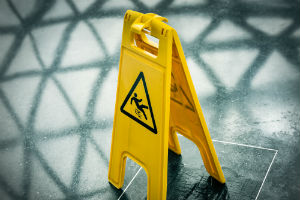
If you slip and fall on another’s property, there are certain factors that must be present when the accident occurred before you can file a personal injury claim.
This includes being able to prove that the property owner’s negligence either caused or contributed to your slip and fall accident. However, it is often in your best interest to consult with a skilled West Palm Beach slip and fall lawyer to discuss your claim.
Contact Gordon & Partners as soon as possible to schedule a free, no obligation consultation to find out if you may be entitled to compensation after an accident caused by another’s negligence. We understand how to represent slip and fall cases and will help you determine if the following elements are present in your claim:
1. A Hazard Existed on the Property
Property owners have a duty to keep their premises safe for guests and visitors, which means it must be free of hazards that could cause injury to others.
In order to bring a slip and fall claim, victims must prove that unsafe conditions on the property created a risk of harm to the property’s legal guests. This can include:
- Slick floors
- Uneven flooring or walkways
- Cracked sidewalks
- Potholes
- Debris on the floor
- Wet pavement
Additionally, victims must also show the property owner was either aware, or should have been aware, that a hazard existed on his or her property.
A court will look at industry standards when determining if a property owner should have known about a dangerous condition. The court may also look at what other reasonable business owners would have knowledge of in similar circumstances. Some factors that could determine a property owner’s liability include:
- How long the dangerous condition was present
- If the property was routinely reviewed for potential dangers by the owner
- What procedures were used by the property owner to check for dangers
- If dangerous conditions could be less hazardous if the property owner had taken preventative measures
Property owners must adequately warn guests and visitors about any dangers that exist on their property. If a property owner fails to uphold this standard, he or she can be held liable for any resulting injuries.
2. The Victim Was Allowed on the Property
For a slip and fall accident claim to be valid, the victim must have been on the property legally at the time of the accident.
A person’s status on a property may vary depending on his or her intention on visiting the property, or his or her relationship to the property’s owner. The types of visitors to a property are:
Invitee
An invitee is an individual who was explicitly invited onto the property for the owner’s benefit. This can include customers to a business, maintenance workers or tenants in an apartment building.
Property owners owe the highest duty of care to invitees, and have to fix all hazards or provide proper warning to invitees that a danger exists on the property.
Licensee
A licensee is someone who is visiting the owner’s property for his or her own purposes. A common example of a licensee could be a friend or family member who is visiting the property owner.
Although a licensee may have been invited by the owner to visit his or her property, there is no direct benefit to the property owner. This means the property owner is obligated to warn a licensee of any hazardous conditions that may exist on the property.
Trespasser
A trespasser is someone who has illegally entered a property without the owner’s permission. Although a property owner is not liable for a trespasser’s safety, he or she cannot attempt to purposefully harm a trespasser.
3. The Victim Was Injured by the Hazard
The next step in a slip and fall claim is determining whether your injury was directly caused by a hazard that formed as a result of the property owner’s negligence.
For a claim to be valid, the victim must have suffered injury due to the hazard. The property owner’s negligence in failing to maintain his or her property must be directly related to the victim’s injury.
When you seek medical care after a slip and fall accident, this link can be established. Your doctor will determine how the injury occurred and document his or her findings in your medical records, which can be used as evidence when pursuing your slip and fall claim.
4. The Victim Suffered Damages Due to the Property Owner’s Negligence
You must have also suffered damages due to your slip and fall injury for your claim to be valid. This can include financial losses that you incurred as a result of suffering an injury, such as:
- Past and future medical treatment
- Lost wages
- Loss of ability to earn an income
- Rehabilitation
- Medical assistive equipment
- Prescription medication
Contact Gordon & Partners for Qualified Legal Help
If you were injured in a slip and fall accident, Gordon & Partners will review your claim and determine if you could be entitled to compensation for your medical bills, lost wages, and pain and suffering.
Request a free, no obligation consultation with our experienced personal injury attorneys in West Palm Beach as soon as possible. We do not charge our clients upfront legal fees and only require payment if we recover compensation for your slip and fall claim.
Call 1 (855) 722-2552 or complete our Free Case Evaluation form today.

 1-855-722-2552
1-855-722-2552